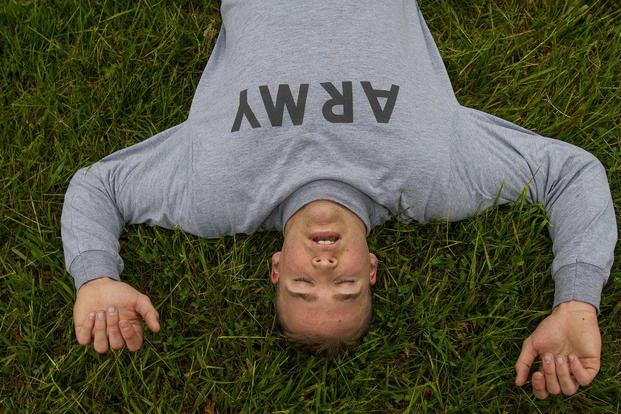If you do not consider the current military fitness test a useful tool to predict success in training or as an adequate assessment of someone's ability to be an effective military member, that's irrelevant. It does not matter what your opinion of any military test is, you still must pass it to succeed in just about any phase of your military career.
As a recruit, you will not graduate basic training without passing a physical fitness test. As a candidate for military special training, you will not get accepted into such training without passing a fitness test. As you progress throughout your career, making the next rank or even staying in the military may be determined by how you performed on a fitness test.
Of course, there are many other determining factors that will determine how you advance in your career, but often the last hurdle is a combination of fitness testing and body fat measurement. So, yes, the fitness test is that important.
Have You Ever Heard the Expression, “Don’t Train for the Test”?
Certainly, training for the test is not the right answer? So many times, throughout the years, a common phrase from the military members themselves as well as some trainers is to "not train for the test."
While it is true that you should not train only for the test, you still need to learn how to master your branch of service's fitness test in such a way that it becomes a non-issue for you. Passing the standards or even exceeding the standards on any day of the week, even when you're tired, should not be such an overwhelming event for you.
Here are just a few examples why you should train for the test, no matter whether you think it is a good test or not.
- Civilian recruits who fail to meet military fitness or height and weight standards will not attend or graduate basic training.
- Civilian recruits who fail to meet the elevated standards of special ops recruiting programs find their spec ops dreams are over before they even start.
- Active-duty members may fail to make rank (or get kicked out of the military) due to not passing a fitness test. Though that separation process is not easy, it has happened.
- College ROTC scholarships often hang in the balance due to a basic fitness test. Obviously, they have met many other standards, but often fitness is the last hurdle for a student trying to receive a scholarship to college. This can be an instant $50,000-$100,000 saved, depending on the institution.
- Midshipmen and cadets get kicked out of service academies or lose ROTC scholarships for failing the fitness tests and failing to meet height, weight or body fat standards. The physical mission matters, and how they test it matters.
- If active-duty special operations candidates show up on the first day of a spec ops program and fail a fitness test, they are done with the program. Now they must find another job that is usually limited to the needs of the military, not their second choice.
Are Fitness Tests Accurate Measures of Ability?
Whether you think a test is an accurate measure of someone's fitness level and ability to be a military member is irrelevant. The test is the test, no matter what you think. In a time of relative peace with no wartime deployments, there may be no need to grow the military ranks, and you may soon see more teeth to the physical mission requirements throughout branches of service and their ranks as downsizing takes place.
If You Are Struggling with the Fitness Test
Struggling with the service fitness test is a real issue for many civilian recruits and active-duty members. If you are having issues with a fitness test, my advice is to take a practice test every other week.
This process alone will help you understand how to take the test better and create strategies that work for you. You may discover the perfect pace you need to reach your goal time on the run or even your goal number on the calisthenics.
Make sure your workouts look like the exercises on your future fitness test. Whether it is the basic calisthenics and cardio fitness test or a more comprehensive combat fitness test like the Marines and Army utilize, your workouts should look like those exercises spread throughout the week in a way that allows you to recover and get better.
Check out the following articles for more information on training ideas:
PT Progression Series: PT Pyramid | Supersets | Supersets with Running. These three workouts will help you with the basic PT tests of pull-ups, push-ups, sit-ups/plank and timed runs.
Smart Split Routines for Weekly Training Ideas: You cannot train the same way every day, day after day. Learn about split routines so you incorporate training and recovery throughout the week smartly.
Army CFT Pyramid Workout
Lose weight and Prepare for Army PFT
Stew Smith is a former Navy SEAL and fitness author certified as a Strength and Conditioning Specialist (CSCS) with the National Strength and Conditioning Association. Visit his Fitness eBook store if you're looking to start a workout program to create a healthy lifestyle. Send your fitness questions to stew@stewsmith.com.
Want to Learn More About Military Life?
Whether you're thinking of joining the military, looking for fitness and basic training tips, or keeping up with military life and benefits, Military.com has you covered. Subscribe to Military.com to have military news, updates and resources delivered directly to your inbox.


















